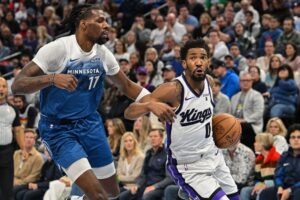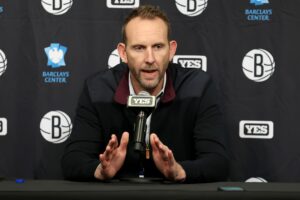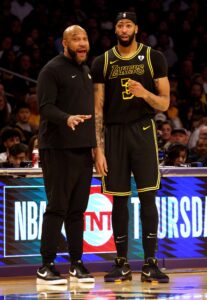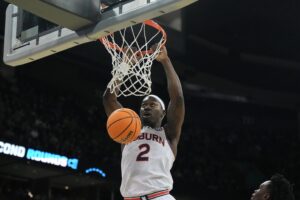Welcome to the Greatest Moment series at Last Word on Pro Basketball, where we’ll present to you each NBA team’s greatest moment of the 21st century. From draft lottery luck, to a franchise-changing trade, to the sweet taste of a championship, every NBA team has had its own special moment to look back on.
In this edition, we’ll relive the greatest Los Angeles Clippers moment of the 21st century: The NBA Bans Donald Sterling for Life.
Greatest Los Angeles Clippers Moment of the 21st Century: NBA Bans Donald Sterling for Life
Selecting the single greatest moment of an NBA franchise is no easy task. Incredible moments happen on the hardwood nearly every night in the talent-heavy league.
For the Los Angeles Clippers, the greatest moment of the 21st Century is not a key shot by a marquee player or a classic contest. Rather, it is the NBA’s decision to ban Clippers owner Donald Sterling and force the sale of the franchise after a recording surfaced of Sterling making highly racist comments.
The Tape
On April 25, 2014, celebrity and entertainment news website TMZ released an audio recording in which Clippers owner Donald Sterling could be heard making a series of racist remarks to his personal assistant and “girlfriend,” V. Stiviano. In the recording Sterling admonishes Stiviano for bringing African-Americans to Clippers games and for posting photos of herself with African-Americans, including legendary Los Angeles Laker and NBA Hall of Famer Magic Johnson, to her Instagram account.
Among other bigoted things, Sterling is recorded as saying:
- “It bothers me a lot that you want to broadcast that you’re associating with black people.”
- “You can sleep with [black people]. You can bring them in; you can do whatever you want. The little I ask you is not to promote it… and not to bring them to my games.”
- “I’m just saying, in your lousy f******* Instagrams, you don’t have to have yourself with, walking with black people.”
- “…Don’t put him [Magic] on an Instagram …. And don’t bring him to my games.”
Never one to shrink from his reputation as an intolerant jackass, Sterling acknowledged making the comments.
Players Respond
The NBA has always featured a very high percentage of African-American players. The 2017 National Basketball Association Racial and Gender Report Card, released June 29, 2017, revealed that those who identified as African-Americans or Black comprised 74.4 percent of all NBA players while 80.9 percent of players identified as people of color. In 2014, when the Sterling saga was in full swing, those numbers were 77 percent and 80.5 percent, respectively. Accordingly, it came as a surprise to no one that players and former players responded to Sterling’s comments with a combination of sadness, disgust and outrage. This was personal.
Magic Johnson, who was featured front and center in Sterling’s tirade, spoke out in a series of angry, yet composed tweets.
TMZ reported this morning that Clippers owner Donald Sterling doesn't want me or other African-Americans to come to Clippers games.
— Earvin Magic Johnson (@MagicJohnson) April 26, 2014
.@cjbycookie and I will never go to a Clippers game again as long as Donald Sterling is the owner.
— Earvin Magic Johnson (@MagicJohnson) April 26, 2014
I feel sorry for my friends Coach Doc Rivers and Chris Paul that they have to work for a man that feels that way about African Americans.
— Earvin Magic Johnson (@MagicJohnson) April 26, 2014
LA Clippers owner Donald Sterling's comments about African Americans are a black eye for the NBA.
— Earvin Magic Johnson (@MagicJohnson) April 26, 2014
As for the Clippers themselves, the timing of Sterling’s misdeeds could not have been worse. The team was in the middle of a first round playoff series with the Golden State Warriors when the scandal broke. All players, regardless of races, were impacted.
Doc Rivers: "JJ Redick was just pissed as Chris Paul." Clippers talked it out in pre practice meeting. Boycotting brought up. Doc against it
— Marc J. Spears (@MarcJSpears) April 26, 2014
In response to the unsavory actions of their long-tenured owner, the Clippers had considered a boycott, but ultimately settled for a silent protest. On April 27, 2014, before Game 4 of the series, the Clippers gathered at center court, took off their warmup shirts and left them in a pile on the hardwood. The players then warmed up wearing inside-out red shooting shirts that did not display the Clippers name or logo. During the game, players also wore black arm or wrist bands and black socks. Other teams in the playoffs, including the Houston Rockets and Portland Trail Blazers also donned black socks in a show of support.
The Clippers, perhaps distracted and overcome by emotion, fell short in Game 4, losing 118-97. However, playing in that particular contest, on that particular day, was about much more than basketball.
The League Responds (The Moment)
The NBA’s response to Sterling’s deeply disturbing statements was swift and strong. Within three days, a full investigation was completed. On April 29, 2014 NBA Commissioner Adam Silver convened a press conference handing down one of the harshest penalties in the history of U.S. sports. It was, and continues to be, his defining moment as Commissioner.
Sterling was fined $2.5 million, the maximum fine permitted, with an agreement that the money would be donated to organizations that promote tolerance and fight discrimination. Sterling was also immediately and permanently barred from attending NBA games or practices, being present at any Clippers office or facility, participating in any business or player/personnel decisions involving the team, or participating in any league business going forward.
Commissioner Silver also announced his intent to “urge the board of governors to exercise its authority to force [Sterling’s] sale of the team,” and opined that he fully expected to get the support he needed from other NBA owners. At the time, there was no question Silver was correct; NO ONE was lining up to defend Sterling. Some NBA owners, like Mark Cuban, questioned the appropriateness of forcing Sterling to sell the team, calling it “a slippery slope.” Many more, however, released strong statements denouncing Sterling and deferred to Silver and the NBA to handle the situation appropriately.
“We Are One”
Commissioner Silver’s announcement of the sanctions imposed on Sterling came just hours before Game 5 in the Clippers-Warriors series. After Silver’s press conference, the Clippers’ adopted the phrase “We are one.”
#WeAreOne #Clippers pic.twitter.com/b25mYzllvG
— LA Clippers (@LAClippers) April 29, 2014
The simple yet powerful statement of equality and acceptance was posted across the Clippers’ social media platforms and grew in power throughout the day. At least a dozen NBA teams posted “We Are One” messages on their websites, and fans and players alike made the hashtag go viral. Even the Clippers’ playoff opponent showed their solidarity.
As the #Warriors prepare for tonight's playoff game, we share in the spirit of this league-wide message. #WeAreOne pic.twitter.com/k07HbGS1r3
— Golden State Warriors (@warriors) April 30, 2014
The message was clear: racism will not be tolerated in the NBA.
The Clippers came out on top in Game 5, beating the Warriors 113-103, and went on to win the very emotional first round series four games to three.
Sterling Loses Franchise
Sterling eventually did lose the Clippers, although not by NBA vote. The franchise was sold by his estranged wife Shelly Sterling, following a whirlwind of events that rivaled even the juiciest of telenovelas.
On May 19, 2014 the NBA initiated a charge against Sterling, seeking to terminate his ownership rights in the Clippers franchise. Sterling was charged with damaging the NBA with his racist comments and having engaged in other conduct that impaired the league’s relationship with fans and merchandising partners. A hearing on the charge was scheduled to begin on June 3, 2014, after which the league could vote to terminate Sterling’s ownership.
In the weeks following the charge, Sterling consistently claimed through his attorneys that he would fight the NBA’s attempts to terminate his ownership rights. It was therefore surprising when it was reported that Sterling had agreed to allow Shelly to negotiate a voluntary sale of the franchise, which they co-owned via the Sterling Family Trust. On May 29, 2014 Shelly Sterling reached a deal, pending league approval, to sell 100% of the Clippers to former Microsoft CEO Steve Ballmer for $2 billion. Shelly also agreed not to sue the NBA and to indemnify the league against other suits related to the case, including any initiated by her husband. In light of the pending sale, the NBA cancelled its June 3 hearing.
Just days later, on June 1, Sterling disavowed having agreed to a voluntary sale of the Clippers and sued the NBA for $1 billion, alleging it had violated both antitrust laws and his constitutional rights.
Three days later, on June 4, Sterling announced he had decided to drop the lawsuit against the NBA, and agreed to allow the proposed $2 billion sale of the Clippers to Ballmer. The cooperation was short-lived. Less than a week later, on June 9, Sterling withdrew support for the sale, and resumed his lawsuit. Shelly’s trust attorneys jumped into action, successfully moving to remove Sterling as trustee of the Sterling Family Trust by arguing that he was incapacitated due to Alzheimer’s. The legal action cleared way for the sale. Subsequent legal efforts by Sterling to thwart the deal were unsuccessful. On August 12, 2014 the NBA issued a statement announcing that the sale of the Clippers to Ballmer was complete.
Post-Sterling Era
By all accounts, the Clippers, and the NBA, are much better off without Donald Sterling. Sterling was, without question, the worst franchise owner in the NBA for decades, simply refusing to invest in the team. The Clippers had only two winning seasons over 32 years under Sterling, and were dubbed the worst franchise in pro sports by ESPN in 2009. Blake Griffin wrote a retrospective piece on Sterling for the Player’s Tribune a couple months after the Clipper’s sale to Ballmer providing interesting insight from a star player’s perspective.
More than just a horrible owner, however, Sterling is, and was, a known bigot with a well-documented history of racist behavior. In 2003 Sterling was sued by the Los Angeles based Housing Rights Center for unlawfully discriminating against African American and Latino tenants and applicants based on race. A similar suit was filed in 2006 by the US Department of Justice. Both suits settled for millions.
In 2009, Sterling was sued by NBA Hall of Famer and longtime Clippers general manger Elgin Baylor for wrongful termination alleging racial and age discrimination. The suit accused Sterling of having a “plantation mentality” for the team, with “poor black kids from the South … playing for a white coach.” Baylor also claimed that Sterling would bring women into the locker room to look at the players and once said to one of the women, “Look at those beautiful black bodies.” The suit was eventually dropped.
Sterling has also been the subject of racial and sexual harassment complaints. How someone with his laundry list of misdeeds was allowed to continue to function as an owner in the NBA for so long is a question someone needs to ask former NBA Commissioner David Stern.
Luckily, Ballmer is the the polar opposite of Sterling. In the short time he has owned the Clippers, Ballmer has invested millions, changed the team’s culture, re-energized the front office, updated the team logo, and focused on making Clippers games more fun for fans. He is courtside, every game, with energy and enthusiasm.
Despite some disappointing playoff finishes, the grey cloud that hung over the Clippers during the Sterling era has lifted, giving players and fans alike hope that a championship will soon be within reach.
Main Photo
Embed from Getty Images






